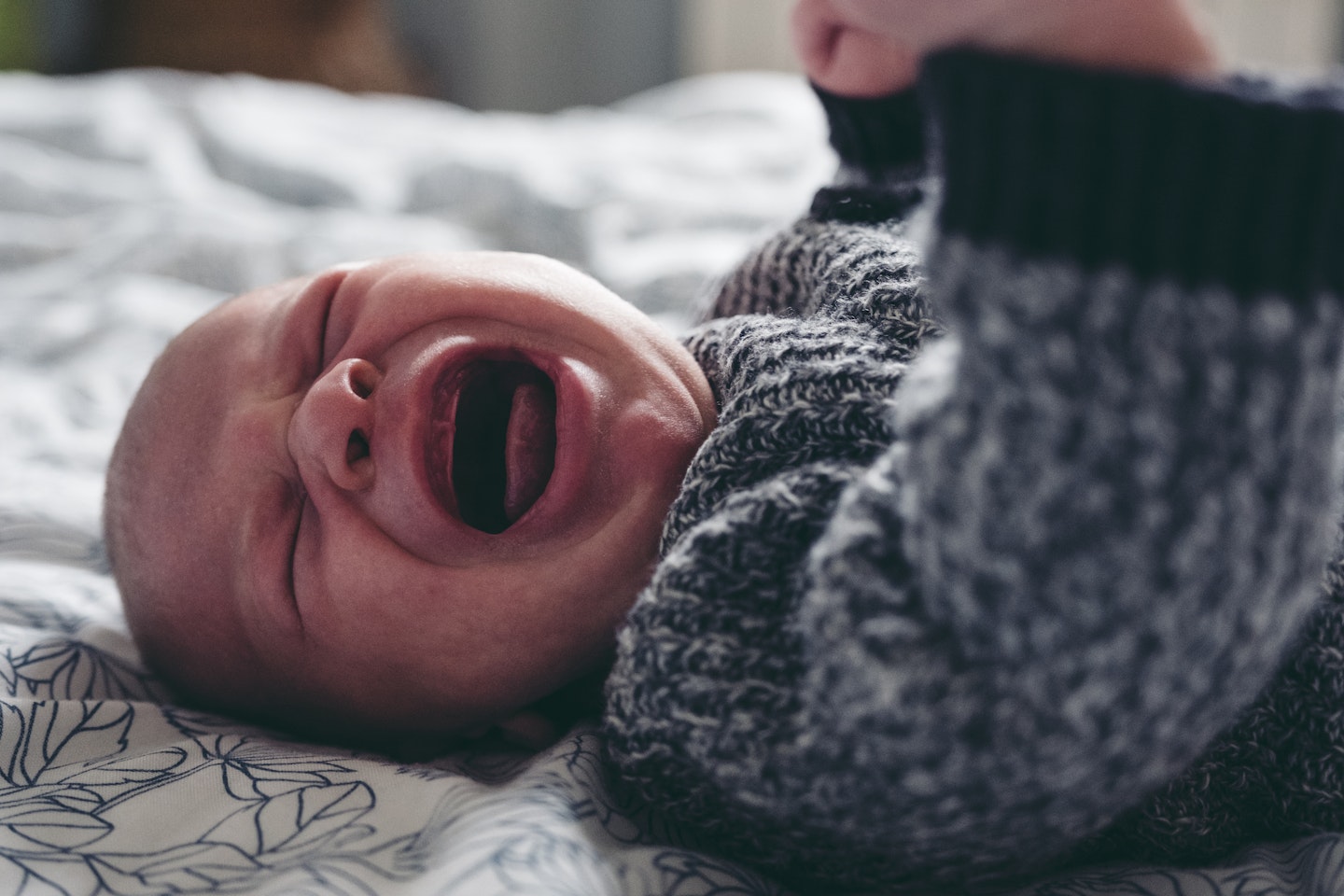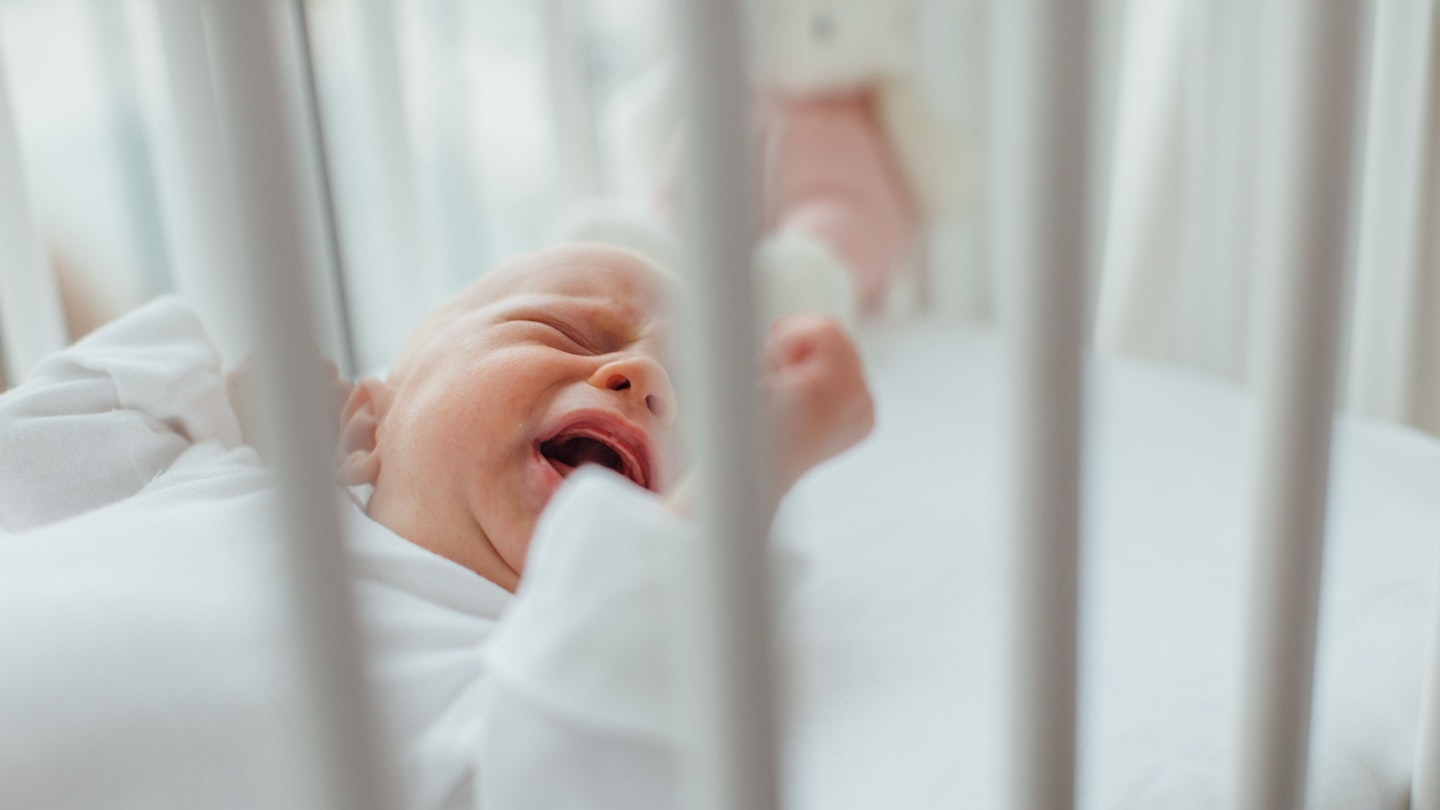When you announce that you're pregnant and the congratulations roll in, amongst all those bubbling voices, there will always be those jokey words we choose to ignore: "Ha ... just you wait for those sleepless nights!" But as a parent it's normal to wonder why is my baby crying in their sleep?
Every expectant parent I have ever spoken to always tell me they had assumed that sleepless nights were simply a result of ineffective parenting, a spoiled baby, definitely not a problem they’d likely encounter.

During the first few nights after birth, most babies are often relatively settled. Sure, they might wake for a feed and a cuddle a couple of times overnight but, by and large, they are mostly manageable. And then you get home...
The most common problem encountered by new parents towards the end of the first week onwards is disturbed sleep and, no matter how many people try to prepare you for this reality, it still comes as an almighty shock.
The shop shelves stuffed with books claiming to help train your baby to “sleep through” and get into a routine are a testament to the fact that having a baby who refuses to let its parents sleep is universal. So why do babies settle in the morning but insist on constant attention during the hours of darkness?

Why do babies cry at night?
To understand your baby’s night time shenanigans we need to look right back to the dawn of time, to where humankind began its journey on this earth. The primitive baby, born to its primitive mother faced a dangerous and often brutally short existence.
A lesson in history
The early nomadic people would hunt, gather and walk during the early part of the day before the equatorial sun was too high in the sky. The baby, easy to see in the daylight and warmed by the easy glow of the morning was at its safest - watched by the tribe and lifted by its mother the moment it started to grizzle and brought close to suckle before being slung into a simple cloth carrier or gently laid back down at feet as mother went back to harvesting. This baby didn’t need to work too hard to stay safe in the morning hours.
As the sun rose in the sky at midday, early humans would almost certainly have turned their attention to finding shade and preparing their shelter for the night ahead. Once in the shade and the cooler air, the young baby needed to work a little harder to stay safe and tended. As long as it was in arms whilst the primitive mother prepared food and a bed, baby would have been ok.

But oh, those nights! The sun falling out of the sky by 6pm, heralding 12 hours of cold, pitch black and the danger of hunting animals, any baby not in arms by dusk would be unlikely to see daybreak. The baby who started to kick off the second it left arms was the baby who would be safest. And this is how evolution works. The fittest and best-adapted survive.
The baby who started to kick off the second it left arms was the baby who would be safest.
So here we are, with our 21st-century lives, living with a baby in possession of a primitive brain, hard-wired for survival. Highly tuned to sense even an inch of separation between its mother’s arms and its own body - for a baby, an arm’s length away from mum might as well be on the other side of the forest - the highly-evolved baby will not tolerate more than a few minutes out of arms in the evening and nighttime hours without crying inconsolably, and the highly-evolved mother feels her heart being wrenched from her chest until her baby’s cries have been soothed.
The nighttime suckling cycle
So the common picture seen in babies under four months old across the world is this:
The clock strikes 6pm, the dinner hits the table and baby starts to wriggle in their Moses basket. Fists flailing towards their mouth with their head swinging around looking for something to suckle, mum thinks: “Must be hungry”. Babe is brought in for a warm snuggle and a boob or a bottle and they suckle away.
Eventually, baby dozes off and, after a bit of patting and ssh-ing, mum gently moves baby towards the Moses basket and places them down carefully. Five minutes later, the wriggling starts afresh, mum thinks: “they must be hungry AGAIN,” and the whole cycle starts over. Rinse and repeat until midnight when the perplexed parents have a couple of hours of peace and quiet before the crying, suckling, 5 minutes sleep, crying, suckling cycle starts again, continuing until almost equatorial dawn-time.

It’s easy enough when someone points all this out, to see why our highly evolved baby, set as they are to survival mode, behave like this, but what on earth are we to do? Well, we can’t beat evolution and, given that this behaviour has developed over millions of years to protect the smallest and most vulnerable of our tribe, it wouldn’t actually be such a good thing if we could “cure” our baby. As it happens, despite what people and books will tell you, babies are actually evolutionarily protected from being able to learn how to sleep through the night or to learn routines in the first half a year of their life. If they could learn to be alone at night, the bears might get them!
The good news is that we have evolved alongside babies to be adapted to their behaviour. The hormones which make us make milk profoundly alter the way we sleep so that we lose the ability to experience any type of sleep other than deep sleep. So the second our eyes shut, we plunge immediately past the lighter forms of sleep straight to deep sleep.
No time is wasted, we “do not pass go”. Whilst our partner, apparently getting a good night’s sleep, messes around in light sleep and dream sleep, only dipping into a deep sleep for short periods of time, we zonk out and, the second our baby so much as sniffs, we rouse immediately and completely feeling as if we have slept for hours, only to look at the clock to discover we have “only slept for ten minutes”! All those little bits of deep sleep add up through the night so that, by morning, we will have actually achieved more deep sleep than our partner.

So, given that our baby really does need to be at touching distance overnight, think about bringing your Moses basket up close enough so that you can rest a hand on your little one overnight or, better still, invest in a “next to me” crib. And, as you have evolved (despite your best efforts to stay awake) to fall off to sleep whenever you suckle at night, lie down to feed and, even if you plan to put your baby back into his crib afterwards, always PREPARE for safe co-sleeping.
Tips for safe co-sleeping
• Baby should be minimally dressed and preferably just in a nappy.
• They should share your light covers and be brought skin to skin so that you can thermo-regulate for them through your close skin contact. You can wear a light shrug to keep your shoulders warm and then tuck your covers under your elbow to keep them clear of your little one’s head.
• Ensure your mattress is firm.
• Don’t come to bed having been smoking, drinking or taking drugs that might alter your sleep (prescription or recreational).
• Don’t use pillows behind your little one to stop them rolling and don’t lie them on a pillow - your pillow should be away from them under your head.
• Don’t leave your baby alone in the bed with your partner. Their sleep is not hormonally altered like yours is and they won’t rouse so immediately.
• NEVER get up to go and suckle your little one on the sofa. Remember that you are highly evolved to fall asleep when you suckle at night and, although you might try to fight it, there is a good chance that evolution will win, you will fall asleep and your baby will then be in significant danger as co-sleeping on a sofa is not at all safe.
• If you do not want to co-sleep with your baby then, after preparing, as described above, for the possibility that you will fall asleep during a night feed, set your mobile to give a vibrating alarm after about half an hour and pop it under your pillow. When it buzzes, check your little one and, if they have dozed off, gently pop baby into their own crib. A “gro bag” sleep suit can be opened right up at the shoulders and down the side to make taking a baby out and putting them back again really easy.
• If your baby is bottle-fed your hormones will revert to normal and you will need to sit up to feed, stay awake and then soothe your little one back to sleep afterwards before putting them safely down in their crib. Try a dummy as this may offer some protection against SIDS as well as a soothing suckle after the milk.
• There is no solution to the protective forces of evolution but, if you can be reassured that your baby’s need to be touching close overnight is normal, that they will grow out of it in good time, and that you are also highly evolved to weather this storm by being able to get deep sleep in a whole new way, it can make those long nights of rocking, soothing and suckling seem more bearable.
